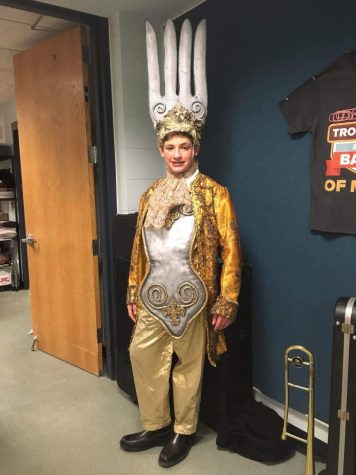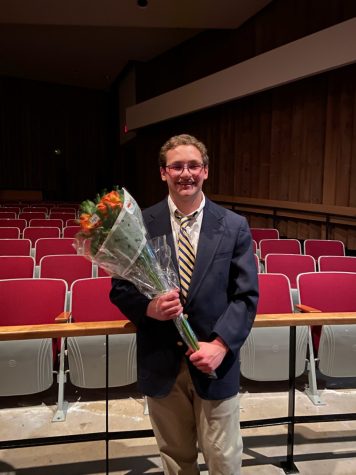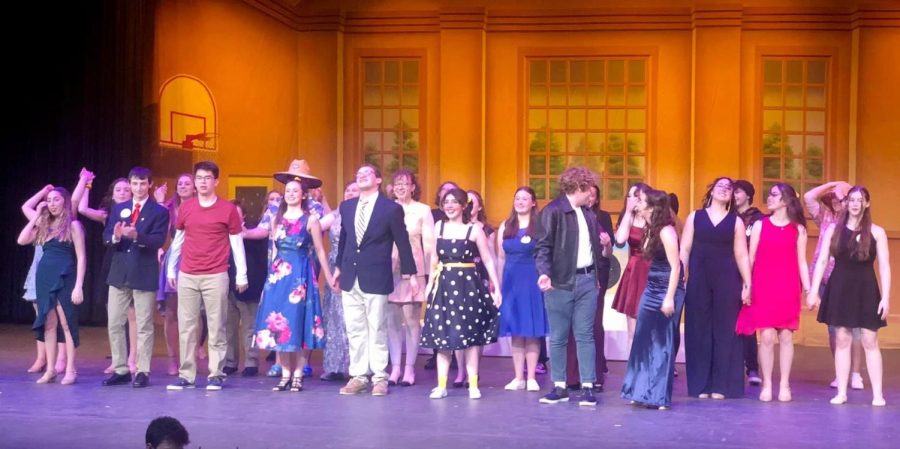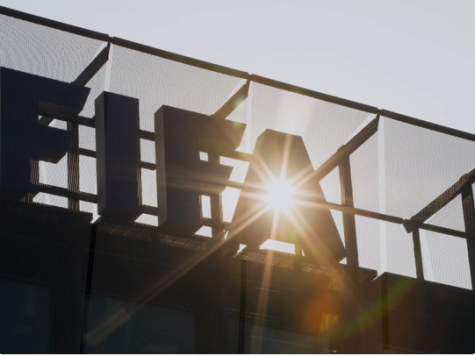What I’ve Learned From High School: The Musical
This is the first post in a series written by staff editor Zach Infeld as a retrospective look on lessons learned throughout high school through various activities and events.
Theater has always been something which has always made me feel like I’m at home. There’s something oddly therapeutic about turning into someone else for a few hours at a time, transporting you into a different world. Not just the audience gets to be transported: we, the actors, do too. The people who we are acting with, even though they’re our classmates, aren’t our classmates when we’re on the stage.
I knew I was going to get involved in theater at Coginchaug. I acted throughout middle school and was a newfound freshman involved in the music department, so it was natural for me to decide to join. Once the signups for Beauty and the Beast in my freshman year began, I got the audition packet. I already knew I was going to be casted as an ensemble member. Ensemble, especially in high school, is one of the most fun times you can have. All you have is your role in the ensemble and your costume pieces, so you can create your own character. You don’t have a predetermined back story or lines to create your part around like the main characters: it’s the purest form of imagination possible. Nothing was more true in the ensemble for Beauty and the Beast. I pretended that I was the town’s newsperson, the stereotypical town crier. The ensemble also shifted from townspeople to the magical objects of the castle. I was a fork, dancing with a

four pronged hat on my head.
The transitions in the show were rapid at times: I remember rushing from finishing “Gaston” as a townsperson into my fork costumes for “Be Our Guest”. A sprint from the stage, to the music room, and back, in between two of the most high intensity numbers in the show. During the last performance of “Gaston”, someone’s foot got injured. I remembered I stepped on something, and I thought it was here: the fault I felt was mine. It resulted in me eventually spending all of intermission crying in the hallway behind the music room, hopefully far away that nobody would notice. I don’t know who told her, but the director, Ms. Schilling, came and talked to me. She told me that she needed me back out on the stage. There were still two big ensemble numbers remaining: “Human Again” and “The Mob Song”. I was already in my costume for “Human Again”, prepared to cross the stage to go to my spot. I went, but I did not go on. I didn’t feel like I could do it, and decided just to sing, still coping. A sophomore then (Class of 2021), came up to me. He was also backstage, not in the scene, and was comforting me. When I went back to the music room to change for “The Mob Song”, I was ready. I didn’t want to lose the final time I got to perform my favorite song in the show. The people in the background make a real impact. While the leads give the story, the ensemble makes it real.
One of the most stereotypical questions we get asked is what we did last before COVID shut everything down. For me, it was a rehearsal for Mamma Mia! Something felt right about that show: something great was going to happen. It was a cast full of people I looked up to, and everything was going to click. The songs in the musical, ones we grew up with, were among the songs which I was most anticipated to perform in my life. We were a month out of the performances, and suddenly we were forced to stop due to the virus. I’m still upset we didn’t get to perform Mamma Mia!.
Disappointment about not being able to perform in Mamma Mia! continued throughout my junior year, as no musical could occur due to the virus. Still I held out a small sliver of hope that we would get to have a senior musical. For the Class of 2022 we only had one so far, Beauty and the Beast. Things were looking in our direction: low COVID numbers, loosening restrictions, and allowance for more after school activities. One night during a show choir rehearsal, the question was asked to Ms. Schilling: any news on the musical? We then got the answer.
It had happened that afternoon. She just got the rights to hold the show (we can’t just pick a show and perform it; it’s a complex process). This year’s show, Emma! A Pop Musical, wasn’t a show I knew existed until we started. The premise of the show was simple: take Jane Austen’s classic novel of the same name, put it into a modern day high school, and set it to female artists from the 1950s to today. The normal cycle began again: information packets, auditions, callbacks, and then the cast list. I was cast as Jeff Knightely, a smart, dry humored student-turned-teacher, hiding his feelings for the main character, Emma, who has instigated matchmaking mayhem.
Musicals come with hard work. The process is long and tedious, but the moments along the way to reach the goal are part of the adventure. We began rehearsals for Emma in January with a script read through scene blocking for the group of lead characters. This process was repeated for three months, with countless hours spent rehearsing songs, learning choreography, and perfecting lines. While the rehearsals are two hours a day, sometimes up to three times a week, they are fun and create incredible bonding moments. In theater, creating and building up trust among a community is one of the most important tasks in rehearsal. If you don’t trust those around you who you’re working with, how can you transport the audience into these different worlds? Anytime we made a bad joke, made a silly mistake, or remarked on something which occurred to us that today, we bonded.
Bonding reaches a whole new level during tech week. In the week leading up to the show, we begin to perform with our pit band, stage crew practices the set transitions, and costumes and microphones are adorned. The first part of tech week was a sitzprobe: the band meets the cast and we sing through everything in order to discuss balance and tempos. The time came for me to sing my solo, “Things I’ll Never Say”, the moment where Jeff explains how he feels about Emma to the audience. Everything was going good, until I decided to look out at the pit band, and I saw them waving their phone flashlights. I started laughing and while I kept going, I kept a smile on my face. Little did I know that everyone behind me had their flashlights out as well. The true power of music and performing is when you make others feel a part of it, even when you can’t see. The rest of tech week flew by: after multiple run throughs, microphone mishaps, and late nights, the opening of the show came.
First show jitters are something we all have. We don’t know when the audience will laugh, when they’ll clap, and how transitions will go. It’s all different when there’s an audience. Thursday night is normally the smallest crowd, but the nerves remained. Before we headed to our places, Ms. Schilling gave us all a penny. She told us to keep it in our shoes or in our pockets. We would all feel the penny throughout the show as it shifts around. The emotional connections we had made would become physical. Places were called, we crossed the stage, and the show began. I looked around through the darkness, and as the music began, it all became second nature. The first time I was offstage, I felt alive. The performance was going perfectly. The momentum from those first scenes kept me going through the entire night, and it was just something to behold. There were a few points which got me worried, such as a transition which was extended

due to a costume issue, but we knew these bumps would happen. Three months of work led to an incredible opening night, but would the other two hold to the same standard?
The second show takes some of the pressure off from the jitters of the first performance. You know when the audience reacts to certain moments, and you know how everything works. However, each night brings certain surprises. The first surprise happened to me. When I went to get my microphone on, Ms. Schilling told me that we’d be changing my physical microphone since I sounded like I was underwater. The mics have two parts: a battery pack and a microphone. The battery pack contains not just the batteries to power the mic, but the antenna which allows it to be picked up by the receivers, and the microphone contains the actual equipment for amplification. We changed the cord, and everything sounded good during the microphone check. I went back into the music room and then to my place for the beginning of the show. The opening number, “Chapel of Love”, went along perfectly. Then came my first line: my mic didn’t work. I knew something was up, but I couldn’t acknowledge it since that would be breaking character. I just continued on like normal, projecting and introducing the audience to who I was. Once I crossed the stage to move to my next place, I was called off stage. Stage crew explained the issue to me. They checked my mic pack, confirming it was on. All of this was occurring during the second song in the show, “Man, I Feel Like A Woman”. I had a line in this, and I knew it was coming. Right before I had to say it, we got the all clear. I crossed and said the line, able to remain in character without disrupting the show.
Once I exited, I overheard the stage crew saying that someone needed to run up and get me a new mic. While they did, we began changing the microphone. The battery pack wasn’t the issue: it was the new microphone. We unplugged the faulty one, threading the new cord and microphone carefully through my clothes to get to my head. However, it would all mean nothing if the mic was not connected to the pack. We were trying to get it to click, rushing to get it attached while everyone was waiting on stage. Myself, alongside another actor who was backstage changing, were telling them to go. The scene began, and we got it connected after much work. I then took a deep breath, went back on stage, and what we thought would become a fix was not.
In that scene, Jeff questions Emma about what is occurring with Phillip (a candidate for student council president) and Harriet (the victim of Emma’s matchmaking scheme). The scene seemed like it was all going well until I spoke. The mic wasn’t fixed, and there was no way to get me off stage in the middle of a conversation and right before a song. The song began, “King of Anything”, a verbal argument between Emma and Jeff that transforms into the entire cafeteria joining in their battle. Acting is a double edged sword: there’s what comes out of your mouth and what your body does. I knew that if I had to make that song succeed, my movements would have to be telling. I did things during that performance of that song that I never thought of until that moment, so I went with it. Once the music kicked in. I didn’t know what was going on with the microphone, and it wasn’t my worry.
The song finished, my character defeated, and the scene continued. I went to move to my next place when I was called over offstage. There were two people I needed to find and get a mic from them. Neither were on the side of the stage I was on. I proceeded to cross the stage, acting like nothing happened and staying in character. I took the mic, and we started to put it on. However, the scene was still occurring, and I had a line to say. I was offstage, in the middle of an unforeseen mic change. The two characters made up dialogue, and the blackout occurred. What was in reality some minutes of action felt more like an hour due to the stress. I was anxious when I returned to the stage for the next scene, even though I knew the problem was solved. Entering as an ensemble member, I went to mime a conversation with another character. She put her hand out to muffle the mic and asked me if her mic was connected, scared she had the same issue as me. After giving the affirmative, we went back to the normal mimed conversation we planned. My next moment happened to be “Things I’ll Never Say”. There were lines before between Emma and I, and once I heard my mic working again, it all felt back to normal. My microphone was functioning for the rest of the show, and besides a little scare later with Emma’s microphone, it all went well.
On the last night of the show, it’s sort of taboo to mention it being the last show. It wasn’t just the last time I sang about wishing for the person whom I loved to notice me or the last time the cafeteria fought against me: it was the last time I got to be on a stage with my friends who I have performed with since elementary school. Many have come and gone, but that’s life. We lose people along the way, but the core still remains. It was also the last time I got to partake in one of my favorite traditions: miming songs backstage. We don’t physically sing them or make noise, but we lip sync to our friends on stage. It helps build that community and provides a bit of relaxation during the chaos. The musical ends with what you’d expect to happen: all of the character’s find love (yes, Jeff ends up with Emma) and rejoice in their new start. The finale of the show is “Unwritten”, a song which has also become synonymous with graduation and senior year. Throughout it, I closed my eyes and just lived in the moment on the stage, the last song I ever would do as a member of Coginchaug theater. Once the blackout occurred, we crossed to our spot for bows. I was to bow last, alongside Emma. Each night, the bow took on a different meaning for me. On

Thursday, it was a bow of excitement: we just did the show for the first time, and we still have two performances. On Friday, it was a relief: the chaos of the microphone drama was over and besides that the show went off fine. On Saturday, it was bittersweet: it was my best performance I thought I did but it was my last. We all locked hands, put them up in the air, and bowed as a group. Theater is a team. Although we don’t compete or bear the Coginchaug name on our attire, we do everything together. Until you’ve been backstage in a musical, you don’t know the definition of teamwork.
Through looking at my experience in musicals, I’ve learned multiple lessons, including the power of being in the background, the savoring of the journey, and the importance of overcoming challenges.





